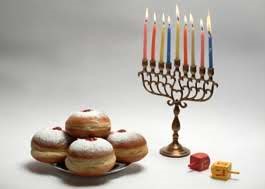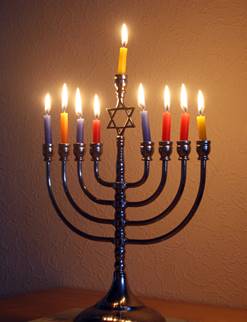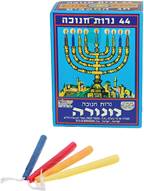 |
 |
THE FESTVAL OF CHANUAKAH
What is Chanukah 
In the Talmud, Shabbat 21b states the following:
"What is Chanukah? The rabbis taught: "On the twenty-fifth day of Kislev Chanukah commences and lasts eight days, on which lamenting (in commemoration of the dead) and fasting are prohibited.
When the Greeks entered the sanctuary, they defiled all the oil that was found there.
When the government of the House of Hasmoneans (the Jews) prevailed and conquered them, oil was sought (to feed the holy lamp in the sanctuary) and only one vial was found with the seal of the high priest intact. The vial contained sufficient oil for one day only, but a miracle occurred, and it fed the holy lamp eight days in succession. These eight days were the following year established as days of good cheer, on which psalms of praise and acknowledgment (of God's wonders) were to be recited."
The Chanukah lights
On page 130 of his book entitled "Does the World Need the Jews", Rabbi Daniel Gordis describes the Chanukah lights as follows:
One moment there is darkness, and next, light reborn and renewed. There is a beauty, an almost magical quality, to this display. It is a quasi-desperate exhibition, a suggestion that the fire does not want to die. It struggles desperately to live. Though the flame will eventually die out, our response is to light the flames again the next evening, adding an additional candle or wick to the collection, making our point that we simply will not allow the lights to go out.
That is the point of Chanukah. It is about lights, but not only the lights of the candles. Chanukah proclaims and insists that the downtrodden, the powerless, the dispossessed and the all but vanquished are these flames. "We have survived, apparently against all odds," we say to the world, "and we believe that you can - and will - as well."
How the blessing over the Chanukah candles changed the Jewish world
The daughters of Rashi, a medieval French rabbi, are seen as some of the most important advocates for change. Lighting Shabbat candles is not commanded in Torah, but Rashi declared that it is a mitzvah and that women are obligated to perform it and that they should say a blessing.
Creating a new blessing was forbidden and although, at this time, there was not a blessing for Shabbat candles, there was the blessing for lighting Chanukah candles, so they adapted it by substituting the word Shabbat for Chanukah and the blessing after lighting the Shabbat candles is now said across the Jewish world. __________________________________________________________________
All contributions are accepted on the understanding that the authors are responsible for the opinions expressed which do not necessarily reflect the views of Ne've Shalom - the Hull Reform Synagogue. ___________________________________________________________________ |
Ne've Shalom
|
|
|||||
 As each evening of Chanukah comes, Jews around their chanukkiot are treated to a sort of ritual dance. It is not a dance of people, but a dance of flames and wicks. As the candles burn low, or as the oil in the chanukiah gradually runs out, the fires do not simply disappear. For the last few moments of their burning, they flicker, seemingly ready to be extinguished, when suddenly they leap back to life. Just when it seems that the flame is gone, it suddenly revives.
As each evening of Chanukah comes, Jews around their chanukkiot are treated to a sort of ritual dance. It is not a dance of people, but a dance of flames and wicks. As the candles burn low, or as the oil in the chanukiah gradually runs out, the fires do not simply disappear. For the last few moments of their burning, they flicker, seemingly ready to be extinguished, when suddenly they leap back to life. Just when it seems that the flame is gone, it suddenly revives.  Long before Jewish feminism, there was a slow movement driven by Jewish women to increase their participation in religious life. Traditionally, women cannot perform any mitzvot that are positive (must be done) or time bound (must be done at this time for x amount of time).
Long before Jewish feminism, there was a slow movement driven by Jewish women to increase their participation in religious life. Traditionally, women cannot perform any mitzvot that are positive (must be done) or time bound (must be done at this time for x amount of time).